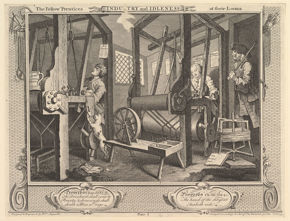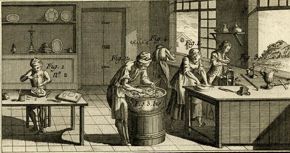Rienzi Symposium
Established in 2014, the biennial Rienzi symposium focuses on topics inspired by the decorative arts, with papers presented by emerging scholars.
Skillful Hands: Apprentices and Networks of Learning 1650–1950

William Hogarth, Industry and Idleness, Plate I: The Fellow ‘Prentices at Their Looms, October 1747, etching and engraving, Sarah Campbell Blaffer Foundation, Houston.
November 9, 2024
The 2024 symposium, “Skillful Hands: Apprentices and Networks of Learning 1650–1950,” explores the networks of learning available—and unavailable—to diverse groups of people, examining how access to training and materials through apprenticeships shaped craft traditions.
Selected participants present their research on Saturday, November 9, 2024, on the MFAH main campus in Lynn Wyatt Theater, located in the Kinder Building. Entrance is included with Museum admission. The event is live streamed and can be accessed here.
About the Symposium
Before the late 19th century, apprenticeships regulated by European craft guilds were the primary means of training in craft trades. These apprenticeships offered a valuable alternative to traditional education but often excluded women, immigrants, Indigenous and enslaved peoples, and children from low-income families.
With the onset of the Industrial Revolution, informal apprenticeships emerged to adapt to new innovations and technologies. Outside traditional European models, skills were acquired through forced migration, local environments, and informal training in various colonial regions. These diverse experiences contributed to a network of skilled craftspeople, both anonymous and renowned.
Program Schedule
11:15 a.m. to 3:45 p.m.
Session 1
11:15 a.m.
Welcoming Remarks
Christine Gervais, the Fredricka Crain Director, Rienzi
11:20 a.m.–12 noon
Keynote: Making Time: Competition and Collaboration in Early Modern European Artisanal Networks
Lauren R. Cannady, PhD, Assistant Professor of Humanities, University of Houston–Clear Lake
12:05–12:25 p.m.
Tactile Nomenclature: Transgenerational Transmission of Silk Weaving Knowledge in Early Modern Iran
Nader Sayadi, PhD, Visiting Assistant Professor, University of Rochester
12:30–12:50 p.m.
Es Artisanes Du Roi: The Public Prohibition and Private Protection of Women’s Artisanal Knowledge in the Paris of Louis XIV, 1661–1715
Jordan Hallmark, PhD student, Harvard University
12:50–1 p.m.
Q&A
1–1:40 p.m.
Enjoy lunch on your own at Cafe Leonelli at MFAH or a nearby restaurant
Session 2
1:40–2 p.m.
The Racial Afterlife of Revolutionary Goldsmithing and Absent Apprenticeships from Haiti to Bordeaux
Benet Ge, Williams College
2:05–2:25 p.m.
“Perfect” Imitations: Learning in The Spanish Colonial Philippines
Lalaine Little, PhD, Director, Pauly Friedman Art Gallery, Misericordia University, Dallas, PA
2:25–2:35 p.m.
Q&A
2:35–2:50 p.m.
Break
Session 3
2:50–3:10 p.m.
Haitian Cabinetmaking Community in New Orleans: The Apprentices of Jean Rouseau and Dutreuil Barjon
Lydia Blackmore, Decorative Arts Curator, Historic New Orleans Collection
3:15–3:35 p.m.
Passing on Knowledge: Learning the Upholsterer’s Trade in the 19th Century
Justine Lécuyer, PhD, Sorbonne Université, Paris, France
3:35–3:45 p.m.
Q&A
Questions? Contact rienzi@mfah.org
Education programs at Rienzi receive generous funding from the Sterling-Turner Foundation; Alkek and Williams Foundation; Carroll Sterling and Harris Masterson III Endowment; and the Caroline Wiess Law Endowment for Rienzi.

